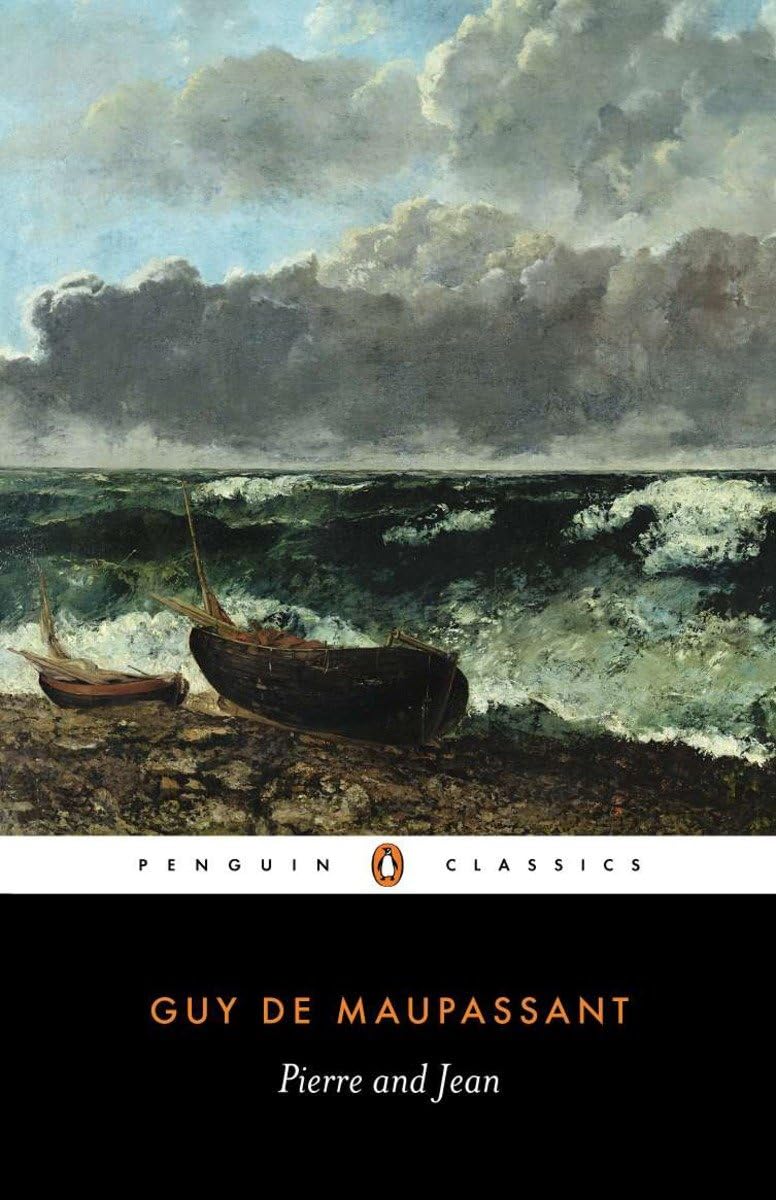

Pierre and Jean (Penguin Classics)
J**T
Five Stars
The book was great....Thank you!
J**C
Exceptional book - Bad translation.
I love the book <<Pierre et Jean>>. I first read it in my Advanced Placement French Language/Literature class. After reading this particular English translation - the Penguin version - I was dismayed at the lack of English grammar the translator exhibited. The book has major grammar mistakes in almost every chapter. Some of these mistakes are not too picky either. For example, the subjunctive mood is often tossed aside by the author. I recommend the book to everyone, but please purchase a different translation - he didn't do the best job with this one. Enjoy!
R**3
Enjoyable, but not Bel Ami
I liked this novel of sibling rivalry and family intrigue. But having just read the author's Bel Ami, this work was a bit of a letdown. The plot seemed a bit contrived, and somewhat obvious; I didn't feel the tension others experienced (at the same time, I didn't find the translator's grammar noticeably bad). Why four stars then? This is a well-paced novel with well-drawn characters; the writing is straightforward and completely understandable; and it's a satisfying work of 200 pages or less.
L**T
The es(sense) of life and the novel
These two small texts, an essay about the (technique of the) novel and the story "Pierre and Jean', are the works of a genius.The novel has to be artlessThe object of the novel is life which is `made of the most differing, unforeseen, contradictory, ill-assorted things; it is brutal, arbitrary, disconnected, full of inexplicable, illogical and contradictory disasters.'The aim of the novel is not to tell a story, to amuse or touch our hearts, but to force us to think and understand the profound, hidden meaning of events. The author must put his work together in such a skillful, hidden and apparently artless way that it should be impossible to perceive his plan and intentions. He must demonstrate how people are modified through the influence of circumstances, how feelings and passions develop, how people struggle in all sorts of social environments, how interests clash. The psychology of the characters should be concealed behind the events of life.Pierre and JeanThis formidable short story is a perfect example of de Maupassant's theory of the novel.Its central subject is parental doubt, provoked by an unexpected event: an old friend leaves his entire fortune to a member of a family.The writing is ingeniously elliptic: the boat which enters the port at the beginning of the story leaves it at the end under totally different circumstances.The images are brilliant: `a short, round man, round through having rolled over the seven seas, whose ideas seemed round like pebbles on the shore.' `All those multicolored dresses, covering the sand like beds of flowers, these gaudy sunshades, the seductive art of gesture, voice and smile, the coquetry displayed on this beach, suddenly were revealed to him as an immense flowering of female perversity.'The endless stream of revelations, of emotionally charged personal confrontations and of the dramatic psychological shocks, ultimately uncovers the es(sense) of life, the passion of love, for an individual human being.This sublime text is a must read for all lovers of world literature.
H**E
Perhaps too real for the modern reader
I read this novel in a day and found keeping the pace up meant I got a lot of enjoyment from the story. It is a very easier going but classic French literary tale in the mode of Zola or Flaubert.Doctor Pierre (30) and Lawyer Jean (25) are the sons of retired jeweller Roland, both are starting out in life looking for a home and a wife. Out of the blue Jean receives an inheritance from Marechal setting him up for life. The dynamic is that it Pierre begins to question why he didn't get anything and wonders if his brotherly angst is more about jealousy - ultimately a classic did or didn't the mother have an affair 25 years ago, family honour impinging on whom?To be honest to a modern reader I would say1) the story is extremely detached from what father Roland might be thinking and his feelings - painted yet again to be the cold husband allowing the mother to be thought of in sympathetic, excusive terms.2) I would also say given the premise, well before the 'reveal' I kept wondering that it would be rather odd and counter productive for Marechal to have created so overtly a moral problem by excluding Pierre, whether or not Jean is the son he wants to advance? Perhaps the final outcome for Pierre is the answer - read for yourselves.
M**R
Changing relationships
A father, mother and two sons receive news that utterly changes their relationships. I enjoyed how this unfolded and wondered, having grown up with the exact same family structure, how such news would've impacted my own family. Maupassant has the knack of capturing the emotional essence without labouring the point and paints such vivid scenery.
Trustpilot
3 days ago
1 month ago